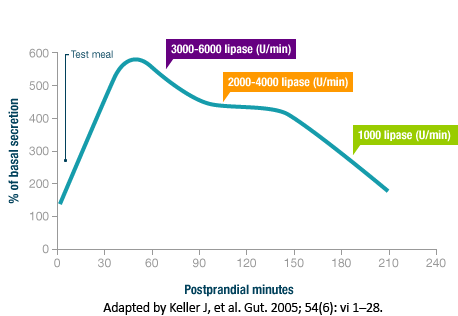Introduction to Effective Dosing
In order to achieve the most effective dose for your patients with Pancreatic Exocrine Insufficiency (PEI), Pancreatic Enzyme Replacement Therapy (PERT) must be able to mimic the physiological conditions of a healthy pancreas. As a result of 100 years of ongoing research and refinements and the launch of Creon® unique minimicrospheres in 1993, Creon® mode of action closely mimics the physiological process of enzyme delivery. Hence, the correct amount of pancreatic enzymes are delivered to the duodenum intact, where they can be activated with food prior to absorption.
Patients with PEI are at risk of fat-soluble vitamin deficiencies and malnutrition related complications1, including:
- reduced quality of life2
- reduced bone mineral density3
- cardiovascular events1,4
Normal Pancreatic Exocrine Response
Following a meal pancreatic enzymes are secreted into the duodenum, approximately 720,000 lipase units are produced per 300-600 kcal meal. The calorie content, nutrient composition and physical properties of a meal influence the degree and duration of the enzyme response.
Steatorrhoea occurs when over 90% of normal enzyme secretion is lost. Therefore, steatorrhoea is a symptom of severe PEI.5
Lipase secretion by a healthy pancreas in response to a stimulus of a 300-600 kcal meal

Hundreds of thousands of enzymes produced by a healthy pancreas travel to the duodenum where they come into contact with the food substrate and start to break down fats, proteins and carbohydrates into smaller molecules for absorption.
Guidelines and clinical trial data
Published treatment guidelines for chronic pancreatitis and pancreatic cancer recommend initiating patients on 40,000 - 50,000 lipase units per meal and 10,000 – 25,000 lipase units per snack.6
In a study of adult patients who required surgical procedures for pancreatic cancer or chronic pancreatitis. Patients who took less than 3 x 25,000 units of lipase per day reported the following:9
- 70% reported steatorrhoea
- 48% reported weight loss
In a different study where patients with chronic pancreatitis took Creon® doses of 80,000 units of lipase/meal and 40,000 units of lipase/snack showed improvement from baseline in:
- fat and nitrogen absorption7,8
- nutritional laboratory parameters7,8
- clinical symptoms8
- quality of life8
If required, patients may achieve further benefit by titrating their dose up.6,10,11
References
- Toouli J, et al. Management of pancreatic exocrine insufficiency: Australasian Pancreatic Club recommendations. Med J Aust. 2010; 193(8): 461-467
- Ockenga J. Importance of nutritional management in diseases with exocrine pancreatic insufficiency. HPB (Oxford). 2009; 11(3): 11-15
- Sikkens ECM, et al. Pancreatic enzyme replacement therapy in chronic pancreatitis. Best Pract Res Clin Gastroenterol. 2010; 24(3): 337-347
- Domínguez-Muñoz JE. Pancreatic exocrine insufficiency: diagnosis and treatment. J Gastroenterol Hepatol. 2011; 26(Suppl 2): 12-16
- Keller J, et al. Human pancreatic exocrine response to nutrients in health and disease. Int J Pancreatol. 2005; 54(Suppl 6): 1-28
- Imrie CW, et al. Review article: enzyme supplementation in cystic fibrosis, chronic pancreatitis, pancreatic and periampullary cancer. Aliment Pharmacol Ther. 2010; 1:1-25.
- Thorat V, et al. Randomised clinical trial: the efficacy and safety of pancreatin enteric-coated minimicrospheres (Creon 40000 MMS) in patients with pancreatic exocrine insufficiency due to chronic pancreatitis--a double-blind, placebo-controlled study. Aliment Pharmacol Ther. 2012; 36(5): 426-436
- Ramesh H, et al. A 51-week, open-label clinical trial in India to assess the efficacy and safety of pancreatin 40000 enteric-coated minimicrospheres in patients with pancreatic exocrine insufficiency due to chronic pancreatitis. Pancreatology. 2013; 13(2): 133-139
- Sikkens ECM, et al. Patients with exocrine insufficiency due to chronic pancreatitis are undertreated: a Dutch national survey. Pancreatology. 2012; 12(1): 71-73
- Löhr J-M, et al. Synopsis of recent guidelines on pancreatic exocrine insufficiency. United European Gastroenterol J. 2013; 1(2): 79-83
- Layer P, et al. Pancreatic enzyme replacement therapy. Curr Gastroenterol Rep. 2001; 3(2): 101-108
Viatris Connect is an online platform for UK healthcare professionals.
Across the website you will find news, blogs and product information.
Register to Viatris Connect today
Please note that the website contains promotional and non-promotional material including educational content and resources to help you and your patients.
REGISTER NOW
 Read Now
Read Now

